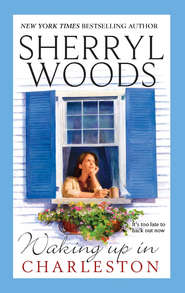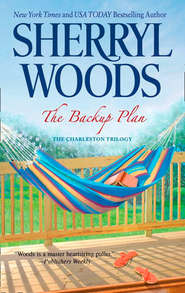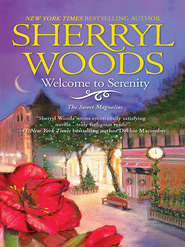По всем вопросам обращайтесь на: info@litportal.ru
(©) 2003-2024.
✖
Ask Anyone
Автор
Год написания книги
2019
Настройки чтения
Размер шрифта
Высота строк
Поля
Chapter 17
Chapter 18
Chapter 19
Chapter 20
Chapter 21
Chapter 22
Chapter 23
Chapter 24
Chapter 25
Epilogue
Prologue
H is son was making a spectacle of himself. Robert “King” Spencer had just hung up on the Trinity Harbor mayor, who was outraged not only by what was going on over at Bobby’s this morning, but by just about everything Bobby had done lately. He had a list, and King had been forced to listen to every fool thing on it.
“Fine people ought to be getting ready for church at this hour on a Sunday morning,” Harvey Needham had groused in conclusion. “Instead, they’re over at your son’s gawking like a bunch of tourists at an amusement park. This has to stop, King. The man’s out of control. And I’d like to know what you intend to do about it.”
“Not a blasted thing,” King had told him, and slammed down the phone.
He sighed heavily. It wasn’t as if this was the first time one of his children had stirred things up in Trinity Harbor. His daughter, Daisy, had almost given him a coronary when she’d insisted on letting that stray boy and his uncle into her life last year. The gossipmongers had had a field day, almost costing Daisy her teaching job in the process. Now, thank the Lord, she and Walker Ames were respectably married and Tommy was on good behavior, which meant it was time for King to turn his attention to his younger son and namesake.
Unfortunately, Bobby was proving to be as difficult to control as Daisy had been. King had almost laughed when Harvey had asked him to step in. As if Bobby would pay an iota of attention to anything his daddy had to say! He seemed to have the idea that he was too old to take advice from his father. So far, that hadn’t stopped King from offering it, but he was beginning to think he was wasting his breath.
What his son—both of his sons, for that matter—needed was a good woman in his life. King had been searching high and low for someone who fit his criteria, someone with a little spunk and a lot of class. So far the search had been in vain, but he hadn’t given up. Of course, once he succeeded in finding a likely candidate, there was no guarantee Bobby would cooperate. More likely the opposite.
The sad truth was that Bobby was stubborn as a mule. King had no idea where he got the trait, but it was a blasted nuisance. Any other man would get at least a token amount of respect from his namesake, but not King. When he tried to advise his son, Bobby merely regarded him with tolerant amusement, then went right out and did what he darn well pleased.
The rebellion had started ten years ago, when Bobby went away to college. King had expected him to take business management or maybe even animal husbandry, something that would serve him well when he took over their Black Angus cattle operation at Cedar Hill, the farm the family had owned for generations.
Instead, the doggone fool had gotten his heart broken by his childhood sweetheart, and in an act of pure spite toward his daddy had signed up for cooking classes. As if that weren’t bad enough, he’d topped it by dropping out his sophomore year and heading to France to take some fancy course in preparing gourmet food. When King had put his foot down and refused to pay for the trip, Bobby had gone out and earned the money himself. He’d worked at a fast-food joint over in Richmond for six months, putting every cent toward an airline ticket. King had never been so humiliated in his life…at least not until Bobby had come home with a diamond stud in one ear.
What kind of real man wanted to learn to cook? That was the question that stuck in King’s craw. Wasn’t that why they paid a housekeeper, so they’d never have to set foot in the kitchen except to raid the refrigerator? And if a man had to cook, what was wrong with a damned fine steak prepared on a grill or taking a wooden mallet to a pile of steamed crabs? That was the only kind of food preparation King wanted any part of.
Now Bobby owned the yacht center in town, spent his nights cooking in the club’s restaurant and devoted his daytime hours to trying to drive his daddy into an early grave by upsetting all the town fathers with his big ideas about developing the waterfront. If he had a specific plan in mind, Bobby hadn’t shared it with his father, but it must be a doozy if old Harvey was in such an uproar that he was trying to drag King into the middle of the fray.
Harvey didn’t like turning to King for anything. The fool liked to believe he was his own man, but when push came to shove, who did he ask for help? That’s right, King Spencer, the man whose family had settled Trinity Harbor way back when. Even Harvey was forced to admit that the Spencer name still counted for something in this part of Virginia.
Not that King didn’t relish a good fight from time to time. Nothing made him happier. He just hated having to publicly side with outsiders against a member of his own family.
He had two choices. He could head on over to Bobby’s and add his two cents to the commotion outside, or he could bide his time and say his piece over Sunday dinner. For once in his life, King opted for discretion.
Besides, he didn’t really want a lot of witnesses around when Bobby told him to mind his own damned business.
1
T here was a merry-go-round in his front yard. Okay, not a whole merry-go-round, just one lavishly carved, brightly painted carousel horse, but it was enough to make Bobby Spencer’s jaw drop. He hadn’t seen anything like it since a trip to the Santa Monica Pier years ago on one of the rare occasions when his father had deigned to leave his beloved Virginia.
That white-and-gold horse was also enough to have drawn most of the neighborhood kids out on a steamy Sunday morning to stare at it in fascination. The only thing that seemed to be keeping the curious youngsters from climbing onto that horse was the presence of a beefy uniformed security guard lounging in a rickety lawn chair about two feet away.
He had a merry-go-round horse and an armed man in his front yard. Bobby was pretty sure he’d awakened to stranger scenes in the past twenty-eight years, but he couldn’t remember when. It was almost enough to make him regret moving away from the family estate at Cedar Hill, where the nearest neighbor was half a mile down the road. Of course, then he would have had King to contend with, and that would have been much worse than this innocent little spectacle.
Only after he’d been standing there, slack-jawed, for a full minute, the morning paper absentmindedly clutched in one hand, did he realize that he was wearing nothing but a pair of boxers, and that any minute now, he was going to become part of the sideshow on his front lawn. Already Sue Kelly and Frannie Yarborough were ogling him with appreciative glances that Bobby might have found flattering if the two spinsters hadn’t been at least seventy and, even worse, the two biggest gossips on the block.
Just when he was about to dart inside to put on something halfway decent and maybe drink enough caffeine to come up with a way out of this crazy situation, a police cruiser rolled to a stop at the edge of the lawn. The county sheriff—his own brother—emerged grinning.
Tucker’s arrival was followed in short order by another cruiser. This time it was Bobby’s brother-in-law, Walker Ames, who got out, cast one look at the scene and, displaying even less restraint, burst out laughing. He and Tucker exchanged an amused look, then strolled toward Bobby, making a pretense of looking somber and official. If he’d been armed, Bobby would have shot ’em both on the spot. No jury on earth—or at least around these parts—would have convicted him.
“Where’s the cotton candy?” Tucker asked, barely containing another grin.
“Very funny,” Bobby snapped, in no mood for his brother’s wit.
“You got a permit for starting up a carnival in a residential area?” Tucker continued, clearly undaunted by Bobby’s sour attitude. “We’ve been overlooking Frannie’s fortune-telling, but this is a little harder to ignore.”
“You don’t have to enjoy this quite so much,” Bobby said.
Tucker’s grin spread. “Sure I do. Best time I’ve had all weekend.”
“So where’d it come from?” Walker asked, his fascinated gaze fixed on the horse with its prancing feet and bejeweled harness. Someone had taken great care with the restoration. It was in like-new condition.
Bobby’s scowl shifted to encompass his brother-in-law. “How should I know?”
“It is in your yard,” Tucker pointed out.
“So are you, but I sure as hell didn’t invite you,” Bobby retorted.
“Seems cranky,” Tucker observed to Walker.
“Downright irritable,” Walker agreed.
Bobby studiously ignored the ribbing. They’d tire of it eventually. Besides, if he was going to get to the bottom of this unexpected gift horse, he needed their help. They might be acting like idiots at the moment, but they both had halfway decent investigative skills, and the authority to go along with it. Without a jolt of coffee, he couldn’t even think.
“Maybe I should call Daddy and get him over here,” his brother said, his expression innocent. “He might have some ideas.”
Bobby frowned at Tucker, who could be an annoying son of a gun on his best days. “You do, and you’re a dead man. Leave Daddy out of this. Besides, I’m sure someone has called him already. People always love to report to King when one of us is causing a scene. Who called you, by the way? Never mind, let me guess. It was the mayor, right?”
Sadly, his nemesis lived just around the corner, close enough to keep an eye on everything that Bobby did. Not that Bobby was prone to wild parties or overnight guests in his restored Victorian house facing the Potomac River, but Harvey was always lurking around, probably hoping for something he could use against Bobby. Bobby had actually caught him outside with a ruler measuring the grass one day, checking to see if Bobby was in violation of the town’s overgrown-lot ordinance.
“Harvey did express some concern that you were desecrating the Sabbath, to say nothing of violating several zoning ordinances,” Tucker admitted. “Though he lacked confidence that I’d handle it with deliberate speed.”
“Which is why I’m here,” Walker explained. “Backup, in case your brother doesn’t follow the letter of the law about arresting the people responsible for public nuisances.”











